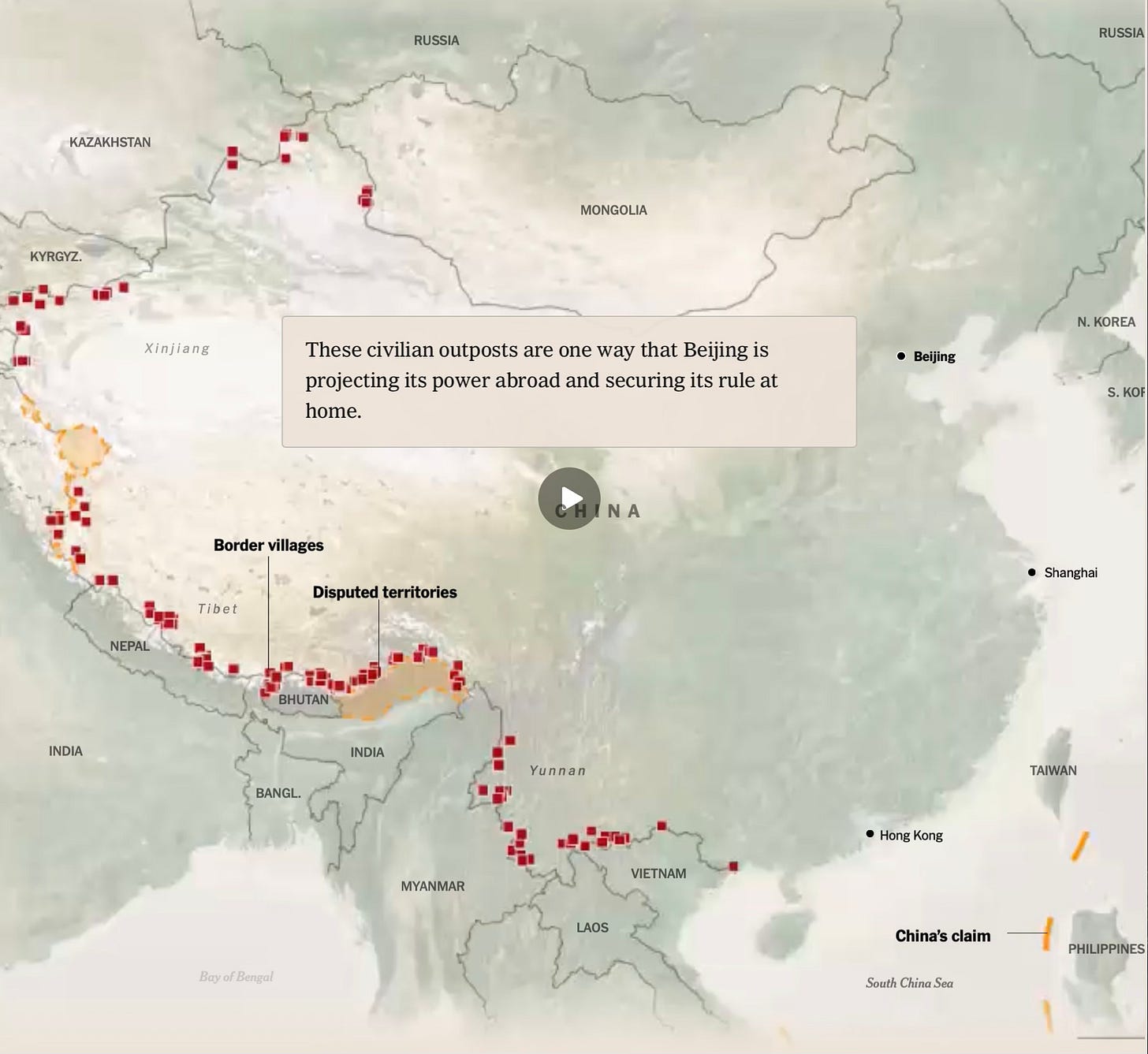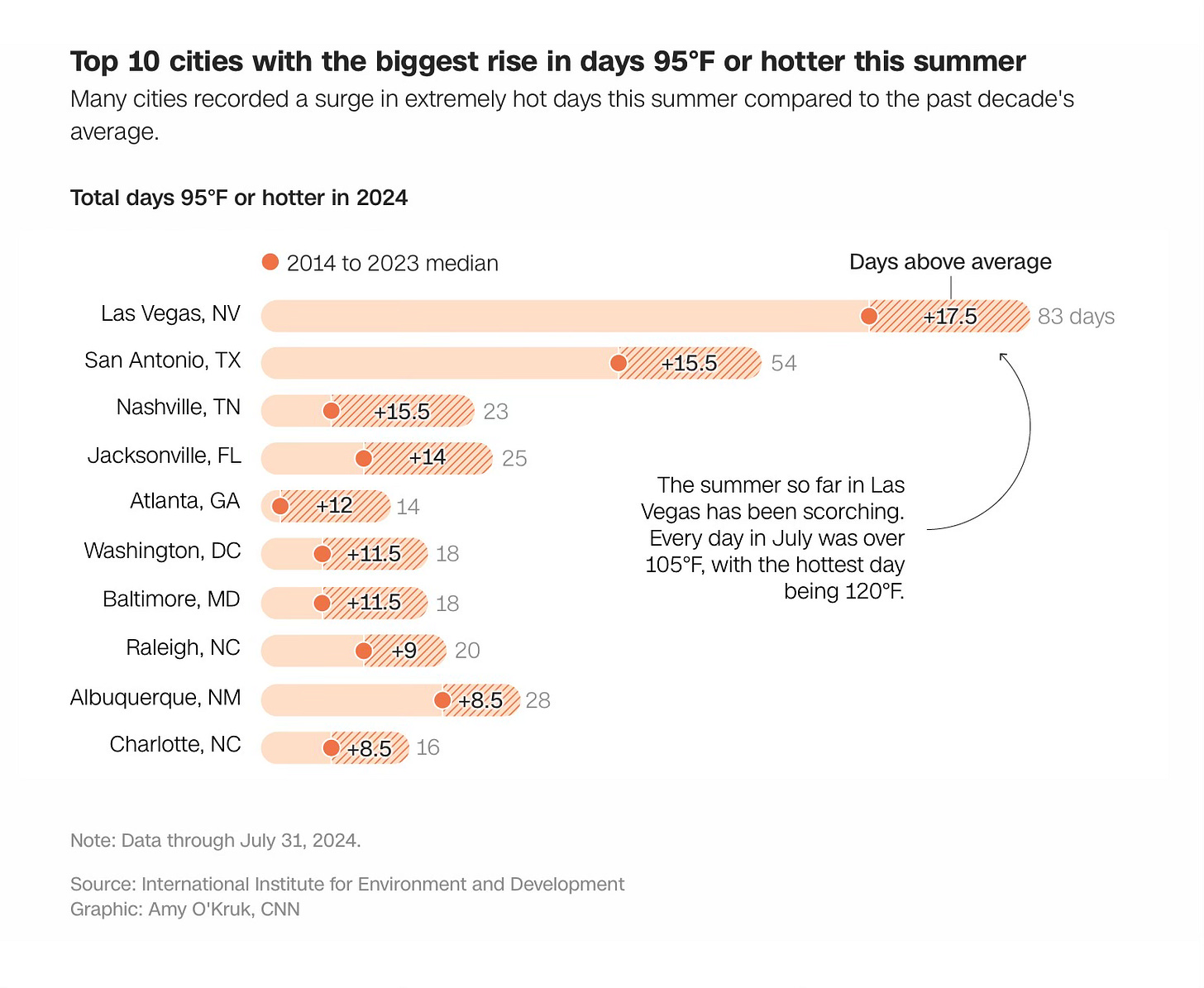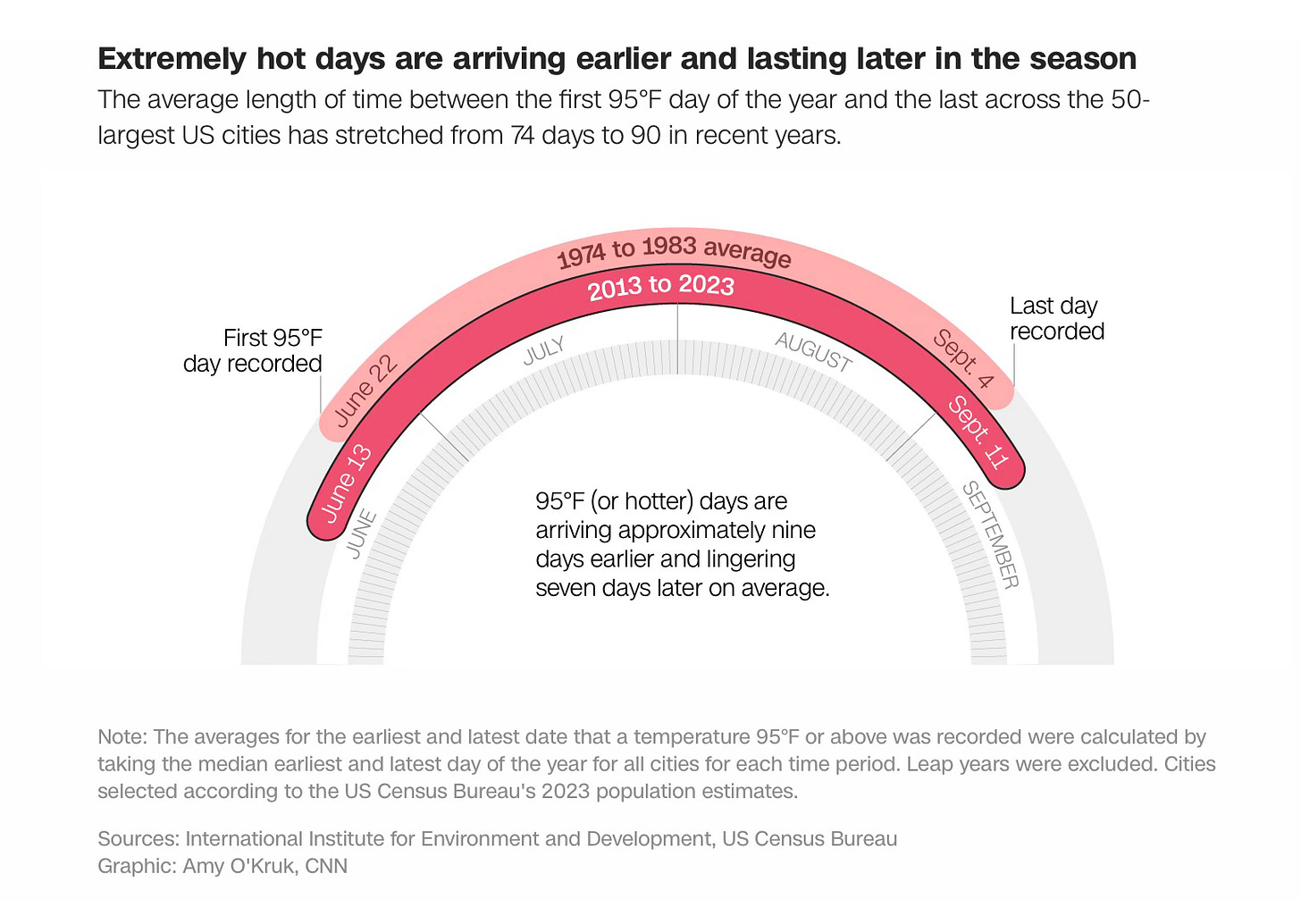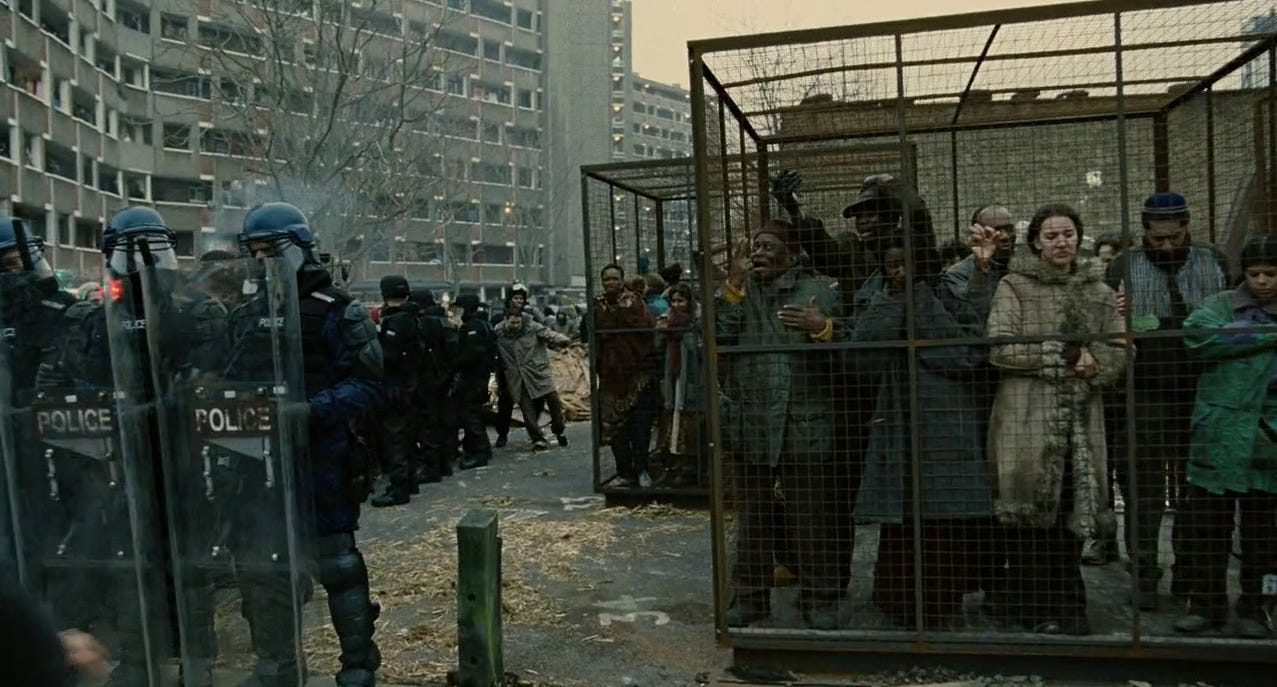1) Nibbling like a silkworm
NYT: China’s Great Wall of Villages
From America’s New Map:
Beijing, keen to present itself as law-abiding, nonetheless sits atop several thousand years of historic expansionism along its borders. In this never-ending endeavor, China has mastered what the West has dubbed “salami slicing” tactics (in Chinese, nibbling like a silkworm), wherein soft- and hard-power schemes combine to incrementally advance their lines of control in an unstoppable sovereign “velocity” not unlike climate change’s creeping advance.
From the NYT:
Qionglin New Village sits deep in the Himalayas, just three miles from a region where a heavy military buildup and confrontations between Chinese and Indian troops have brought fears of a border war.
The land was once an empty valley, more than 10,000 feet above the sea, traversed only by local hunters. Then Chinese officials built Qionglin, a village of cookie-cutter homes and finely paved roads, and paid people to move there from other settlements.
China’s leader, Xi Jinping, calls such people “border guardians.” Qionglin’s villagers are essentially sentries on the front line of China’s claim to Arunachal Pradesh, India’s easternmost state, which Beijing insists is part of Chinese-ruled Tibet.
Many villages like Qionglin have sprung up. In China’s west, they give its sovereignty a new, undeniable permanence along boundaries contested by India, Bhutan and Nepal. In its north, the settlements bolster security and promote trade with Central Asia. In the south, they guard against the flow of drugs and crime from Southeast Asia.
This is the same sort of “creating facts on the ground” (old Israeli term for its settlements in the West Bank) that leads China to manufacture islands in the South China Sea (creating ground as facts).
Brahma Chellaney, a strategic affairs analyst based in New Delhi, said that in quietly building militarized villages in disputed borderlands, China is replicating on land an expansionist approach that it has used successfully in the South China Sea.
“What stands out is the speed and stealth with which China is redrawing facts on the ground, with little regard for the geopolitical fallout,” Mr. Chellaney said. “China has been planting settlers in whole new stretches of the Himalayan frontier with India and making them its first line of defense.”
India now feels compelled to respond with its own “vibrant villages” that revivify old settlements that have gone to seed.
This is China still behaving like the wounded, mid-range power it became during the European colonial era (1550-1950). Beijing seems incapable of escaping that trauma and so, despite the fact that it has risen, the Party still obsessively focuses on its borders.
Build a great big wall, already!
The paradox is similar to what China generates with its over-build-up of military power in East Asia: the more it does to secure itself, the more it scares its neighbors who arm-up/match its efforts in reflexive response.
China remains weird in that way: it does some incredibly impressive stuff that makes it look like it wants to rule the world, but it still does some incredibly retrograde stuff that makes it look like it’s scared it will collapse any day now.
China is all grown up now as a superpower; it just doesn’t yet know how to act like one.
And maybe it never will.
And maybe that’s not a bad thing.
2) My AI minions
NYT: Will A.I. Kill Meaningless Jobs?
I can’t afford to have research assistants or subordinates generate my analysis, frame my writings, even populate my books. I don’t live at that level and honestly would be very uncomfortable trying to compete on that level. I’m a bit obsessive about getting the facts and the details and the sources and the data right.
But do I trust AI to play that role?
Increasingly, yes.
Do I methodically check AI’s work? Yup. But I am beginning to trust it more and more.
So, when I look at AI, I see empowerment for somebody like me, who does generate everything like a one-armed paper-hanger.
I am making my peace with it, one could say, based on my firm belief/experience that, while AI can wear down Tommy Boy (a nickname only allowed to my brother James), Tommy Boy + AI beats AI every time.
So, yeah, the job of being my research assistant has been killed. I feel okay about that, but do wonder what it must be like for those coming up: those who, for example, don’t get that RA experience that I got when I served Prof. Adam Ulam, director of Harvard’s Russian Research Center for five years (1985-1990).
Yes, all I did was the menial stuff of finding him books and sources at Widener Library, but I did learn plenty in that rudimentary skill set, and Adam became a genuine mentor and friend.
So, what does the NYT say? It cites a very different sort of work experience:
When Brad Wang started his first job in the tech industry, right after college, he marveled at the way Silicon Valley had turned the drudgery of the workplace into a sumptuousness of game rooms, nap pods and leafy hiking trails. This is what it must have felt like to be a guest showing up for a party at Jay Gatsby’s house, Mr. Wang thought.
But under the glitz was a kind of hollowness. He hopped from one software engineering role to another, toiling on some projects that he felt were meaningless. At Google, he worked for 15 months on an initiative that higher-ups decided to keep pursuing even though they knew it would never launch. He then spent more than a year at Facebook on a product whose primary customer at one point described it to the engineers as unhelpful.
Over time, the pointlessness of his work began to incense Mr. Wang: “It’s like baking a pie that’s going right into the trash can.”
This dynamic is presented like middle managers making up work to justify their existence, and yeah, it’s not hard to imagine AI wiping out a lot of such jobs in management just like the early IT revolution killed things like secretaries, typists, mail-delivery clerks, etc.
Will leaner organizations result? We can hope. But will past career paths of ascension likewise disappear? That’s the scarier part described here as “A ‘species-level identity crisis’” that can further hollow-out the middle class.
The silver lining expressed near the end: we as a society and economy move past our obsession on making stuff and start to re-evaluate “connective labor” that involves us actively caring for one another (like my spouse working as a hospice social worker; she should be paid NFL money to do that difficult work).
I can see that shift in my kids already: a growing bias in the direction of connective labor, and it fills me with a certain hope that, as we go deeper into this age of superabundance, we take our foot off the gas pedal and start treating each other in a more caring and supportive fashion, leaving the drudge work to AI.
3) Hot time in the city
CNN: These cities will be too hot for the Olympics by 2050
CNN: American cities are getting unbearably hot. These ones are roasting the most
Cities being ruled out for not-all-that-far-in-the-future Olympiads that would end up being too hot or, presumably, not cold enough.
I can remember in the early 1990s, when training for marathons in Washington DC, that I had to get up and run at 5am to avoid the “bad air” of midday, when I was told that a 20-miler was the equivalent of smoking three packs of cigarettes.
Seriously.
Then there was also the sheer danger of that much exertion in that much heat and humidity — such that my elbows and pinkies would literally “freeze” up from the cooling effect of all that sweat running down my arm. It’s bizarre stuff but very real to top-flight athletes.
So, I guess Canada and Russia get to host all the summer games?
This is no joke and is already in the works, as bids are being worked for Games as far ahead as 2036 right now.
Meanwhile, dangerous days are piling up in US cities:
Our Southwest is being transformed:
Over the long term, big cities in Texas, Arizona and inland California have been worst-hit, in terms of the rise in extremely hot days.
Of the 10 cities that recorded the biggest increase since the mid-70s, seven are in Texas.
Summers are just getting that much longer and hotter:
We will see our Southwest depopulate in coming decades. Count on it. It is already beginning, this dynamic.
4) With friends like these
FOREIGN AFFAIRS: China Is in Denial About the War in Ukraine
NYPOST: China’s $60 billion bet on Venezuela’s corrupt tyrant, Nicolás Maduro
On Ukraine, the argument is basically that China’s experts and think tanks tend to be more cautious in their analysis of what it costs China to support Russia — unlike the Party leadership.
During my three years (2015-2018) working as a visiting scholar at Knowfar Institute for Security and Defence Studies (Beijing), and in the preceding years of interactions with these experts going as far back as 2004 (when I combined an adoption trip with several speeches to Party elite circles), I was (and remain) impressed by the sensibility of their thinking.
And yes, that experience marks me as “Tiananmen Tom” for all times because … well, it just does.
I’m not one who thinks the Chinese are superior strategists per se — just that they view the world differently. I also judge their views as better suited (for the most part) to the age we live in (one shifting from E-W dynamics to more N-S dynamics). Like I noted above, China still views itself as a medium-sized power a lot of the time, and that’s a problem for everybody. But, in general, the pool of strategic expertise in China gets it more right nowadays than much of the US strategic expertise that is now lost to rerunning the Cold War/containment/WWIII.
Saying that doesn’t mean any of that logic is driving CCP leadership today. China and all Chinese are basically living in Xi Jinping’s head right now, just like Russia and Russians are trapped in Putin’s brain (or the GOP that is trapped in that vast empty space known as Trump’s noggin).
And this is where democracies win: we swap out our leaders. Erratic at times but course correction-able in a profound way.
Back to Ukraine: Anyone who’s read America’s New Map knows I am a big fan of China’s Joseph Nye-equivalent Yan Xuetong, whose recent book I quote at some length:
For a longer-term expression of Beijing’s ongoing effort to revise global rules, we turn to Yan Xuetong—dean of Tsinghua University’s Institute of International Relations—and his 2019 book, Leadership and the Rise of Great Powers. In it, Yan proposes a rising China can overtake far wealthier (per capita) America as the world’s dominant power. His highly Confucian argument: superior national leadership projecting superior moral authority abroad. By efficiently ruling at home through progressive reforms, Beijing’s leaders have, in his estimation, closed the power gap with America.
But what closed that gap even more, in Yan’s analysis, has been the inferior quality of America’s political leadership, specifically their inability to effect necessary domestic reforms. Hard to argue there.
Thus, China’s growing advantage in political leadership capability gives it greater “strategic credibility” as a global leader. While American political leadership yo-yos between withdrawal (Barack Obama, Joe Biden), aggression (George W. Bush), and erratic untrustworthiness (Donald Trump), Beijing’s current ruler, Xi Jinping, appears a paragon of stable progress. Per this logic, Xi’s deep embrace of dictatorship is excusable as a necessary means to those greater ends of stability and credibility.
In Yan’s analysis, China’s growing leadership advantage, along with its consistently improving standing vis-à-vis the United States, allows for a new type of international leadership to emerge, one based on “humane authority” instead of brute force (e.g., US military power). In time, this new international authority can generate new international norms and a new international structure. China does not have to defeat America militarily; it must consistently outperform it on global authority and leadership by being more dependable, trustworthy, and moral.
Well, as you can imagine, China is losing a great deal of moral authority by being associated with Putin’s war in Ukraine, leading Yan to argue, in 2022, that:
The negative impact of the war on China [will be] huge.
As the FA piece notes, many Chinese elites now view the situation with less fear, since Beijing has worked assiduously to insulate itself from Western sanctions associated with the conflict. Plus, it’s clear that China is now ripping off Putin on energy sales like crazy — also a clear positive.
And yet … Yan’s argument about moral authority still holds, even as Chinese experts increasingly judge Western support to Ukraine to be growing more shaky:
Although these scholars tend to be careful not to discuss the contours of a potential war in the Taiwan Strait too explicitly, many seem to be drawing a straight line from the cracks in the United States’ determination to support Ukraine and its likely will to stomach a possible protracted conflict with Beijing.
China’s expert class, like Yan, have long thought a new global order of multipolarity was favoring their nation’s rise, so if Russia gets away with Ukraine, then that signals more potential for China to assume global leadership.
But these experts have, per the article, underestimated the sea change in Western thinking about China’s rise in association with Russia’s aggression. Then there are the harsher lessons of Russia’s misadventure in Ukraine that suggest far greater uncertainty in modern warfare than the CCP leadership may care to entertain regarding any Taiwan scenario.
To keep in mind: the PLA hasn’t fought a war in roughly half a century. The odds of it pulling off a quick and clean takedown of Taiwan … are terrible, meaning the inability of a population to handle a long slog is just as easily likely to unfold on China’s side than across the West.
That was always my advice to the Party elite through Knowfar: basically a variation of you can’t handle the truth … of modern warfare. A true superpower can engage in war and lose and still remain a superpower. America has shown that. But I don’t think China’s political system has anywhere near that resilience, in large part because the “bums” cannot be “thrown out” in an election. So, my basic advice was, Don’t invade Taiwan unless you’re sure your regime can survive losing.
China, led by the CCP, should never reach that conclusion — if its elites are half as clever as we imagine them to be.
Speaking of losing bets … the one Beijing placed on Venezuela’s Maduro seems to be going badly. That’s another bit about being a real superpower: you have to be able to lose such bets and nonetheless remain a strong player.
5) Who moved my army?
ISW: Ukraine and the Problem of Restoring Maneuver in Contemporary War
Love the cover shot. Gives you a sense of the problem: drones are killing maneuver warfare.
Me? I don’t see any restoration in the works. I see the Military Singularity killing conventional warfare’s utility when it comes to territorial conquest.
And that’s a good thing.
6) Is it just me? Or are [winters/summers] getting [better/worse]?
WAPO: Summer or winter: Which season is warming faster in your town?
The short answer is mostly that the warming of the winters outpaces the heating up of the summers. We just like the former even as the latter grows more intimidating each year.
Of course, the lower the latitude, the more those dynamics even out and then eventually tilt toward the supremacy of hotter summers.
The basic reality is clear enough:
Regardless of which season is warming faster, one thing remains clear — both winter and summer are hotter today than they used to be. On 92 percent of Earth’s surface, both seasons have warmed.
Of course, the biggest shifts are in the North:
But the largest gap between winter and summer temperature trends can be found where almost no one lives. Above the Arctic Circle, winter temperatures have risen at a rate of more than 1 degree per decade over the past 80 years — nearly four times faster than summer.
Which gets us to ice melt and rising sea levels in the circle of climate change.
Tipping points loom. Debate them at your peril.
7) The Children of Men
WAPO: What deporting 15 million people would look like
People have little idea of what it would take to deport millions, as Trump and Vance promise so blithely.
I say, go back and watch the 2006 movie “Children of Men” (based on the P.D. James novel) to capture the xenophobic fervor/vibe that erupts when you — in the North — combine depopulation with climate change-driven poleward migration.
It will get VERY ugly.
8) Wind beats rock (two out of two)
NYT: Wind Beat Coal Two Months in a Row for U.S. Electricity Generation
Subtitle explains all:
The shift occurred as the cost of wind power and other renewable energy is rapidly declining and coal is being pushed out by natural gas.
Natural gas is a positive fellow traveler in the Green Rev, so hold off on demonizing it like oil and coal.
9) The global supply-chain shift explained
NYT: The Changing Supply Chain
Just a great explanation:
For decades, major companies have behaved as if geographic distance were almost irrelevant. A factory in China was the same as a factory in Michigan. The internet, container shipping and international trading arrangements had supposedly shrunk the globe.
No longer. The pandemic and geopolitical upheavals have exposed the risks of depending on faraway industry to make critical things like computer chips, protective gear and medicines …
The emergence of Covid in China ended the previous version of globalization. Quarantines shut Chinese factories at the same time that Western consumers, stuck in lockdown, ordered more manufactured goods like exercise equipment and electronic gadgets.
This combination of reduced supply and surging demand made other countries realize that they had become heavily dependent on a single nation — China — for many items, including medical supplies. Covid eventually faded from the headlines, but policymakers and business executives in the United States and Europe faced pressure to diminish their reliance on China.
A central reason for concern was the rise of geopolitical tensions. China wasn’t merely the world’s factory; it is also an autocracy that, under President Xi Jinping, has become more aggressive in asserting global influence …
China’s allies have also become more assertive in ways that have disrupted global commerce …
Globalization’s next phase
The main strategy would have countries make more goods at home …
Wealthy nations are also sending their orders elsewhere. Vietnam has gained factory orders, and India has emerged as another alternative. As the world’s most populous nation, India might eventually develop a supply chain rivaling China’s. Walmart is now moving some production from China to India.
In the short term, Mexico is a more realistic option for companies that sell many goods in the United States. Mexico has low labor costs plus road and rail connections to American consumers. Asian companies that make parts for U.S. automakers are already setting up factories in Mexico.
Great summary that basically captures my follow-the-demographic-dividend logic (Check out SE Asia! Check out India!) — without acknowledging the demographic drivers (and thus over-emphasizing the pandemic’s effect).
Also short-changed here: the notion that shifting to SE Asia or India somehow cuts China out of the chain. It does not. Chinese companies are moving into these regions plenty fast, so, no, there is no real “de-risking” — just a lengthening of supply chains that gives the illusion of decoupling.
Still, I like this summary a lot, despite those issues.
10) Russia going extinct
ATLANTIC COUNCIL: A Russia without Russians? Putin’s disastrous demographics
Russia’s demographic future is bleak and must inevitably be “fixed” or overcome through climate change-driven mass poleward migration.
And yeah, Russia will stop being Russian when that unfolds in all its transformative impact.
And no, Russia proper will not be missed when it disappears into a number of successor states.
11) Drill baby drill
NYT: Why no president has slowed the U.S. oil boom
Podesta nails the strategic logic:
John D. Podesta, senior adviser to the president for international climate policy, defended Biden’s record on fossil fuels during an event on Tuesday hosted by Third Way, a center-left think tank. He said that record U.S. oil production is a “market-driven phenomenon” that has economic benefits in the short term, even as the country transitions away from fossil fuels in the long term.
“On the gas side, I think it was important that we could supply our friends and allies in Europe after the illegal invasion of Ukraine and cutoff of Russian sources of supply,” Podesta said. “On the oil side, we continue to benefit from production and the effect that it has on stabilizing prices around the world. We’re seeing gas prices that are about 40 cents lower this summer than they were a year ago. But we also have to transition.”
We won’t drive the Renewable Energy revolution by restricting fossil fuels. We will drive it by making RE a better deal.
Remember, there is what developed markets can pull off and there is what emerging markets can pull off. We need to lead and profit from that leadership on both sides of the RE/fossil divide.
12) Tick velocity
BLOOMBERG: Why Ticks Are Becoming an Even Bigger Danger
Climate change favors the small and highly procreative, along with those able to match climate velocity as climes shift poleward.
It sucks, I know, just like ticks do.





















Article #2... all familiar notes to me.
About to finish my 18th year in tech, more than half was meaningless work much like the subject of the article experienced. Had to grind up to almost VP level in a Fortune 500 before I was able to call my own shots.
Business people are very bad at software and its pretty common for developers to be asked to build things simply so that suits can actually see it and understand it........ and then toss it away or have it be obsoleted in the time it took to create... done it many times myself. Soul draining
I'd compare it to building a house without a blueprint just so you can walk around it..... then decide if you like the floorplan or not.
AI will help a lot there (well, "help" depending on which side of the equation you're on)... can get pretty far in prototyping and quite adept at handling loads of the grunt work involved in software... its already pretty good and not hard to imagine it being fantastic in 2-3 years time
I use AI (mostly GPT4) a lot like you... a professional assistant of sorts. Absolutely irreplaceable as a "good enough" helper... for 1/10000th the cost
surprised I dont see more praise on GPT for that kind of thing, I just think that tech is so top heavy now and those big orgs are more afraid of GPT than enthusiastic.... for startup/independent types its a dream come true